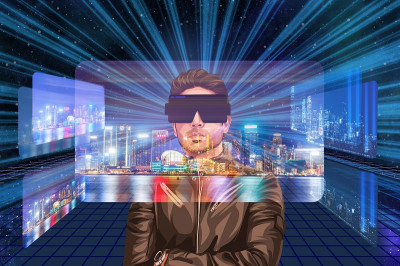Indepth: Immersive, real-time - Can Metaverse redefine how personalisation works?
Picture yourself (or rather, your avatar) attending a close friend’s wedding in Metaverse because you are away on an unavoidable business trip. Or picture this: you are a nostalgia-bitten time-travel junkie eager to travel back in time to experience first-hand how your ancestors of yore lived? Or how would you feel to be teleported to exotic/ fantastical places (or even into space) that you have seen only in your wildest dreams?
All these scenarios, hitherto fodder for sci-fi writers and futurists, might become a (virtual) possibility in the near future. And you can do them with consummate ease and élan. All thanks to the Metaverse!
In this five-part Indepth series, AdGully is taking a deep dive into the immersive world of Metaverse, unlocking its many facets, with rich insights from a wide spectrum of industry stakeholders.
The term Metaverse, a portmanteau of “Meta” (meaning beyond) and “Universe”, has been around for 30 years. It was first used by Neal Stephenson in his 1992 science fiction novel ‘Snow Crash’, which envisioned a virtual reality-based successor to the web. Seven years later, the 1999 movie, ‘The Matrix’, conjured up a virtual reality for the humanity. Metaverse may contain elements from the fictional world, but it is neither dystopic nor utopian, even though it is difficult to come up with a definitive definition for the term. As rightly pointed by Square Enix CEO Yosuke Matsuda, who maintained that trying to define the Metaverse “so rigidly limits the imagination of creators”.
So, what really is Metaverse? Is it going to be the next big thing for the world or just another fad hyped beyond its worth? To all the naysayers and modern-day Luddites, Metaverse is not going to supplant the real life! It will just complement our real lives in myriad ways. The Metaverse, thus, can be loosely defined as a parallel virtual world that will have a direct bearing on almost all the everyday activities of human life.
Metaverse, says a June 2022 report by McKinsey & Company, may “seamlessly combine our digital and physical lives by featuring a sense of immersion, real-time interactivity, user agency, interoperability across platforms and devices, the ability for thousands of people to interact simultaneously, and use cases spanning activities well beyond gaming.”
According to the McKinsey & Company, corporations, VCs, and PEs have already invested more than $120 billion in the Metaverse in the first five months of 2022.
At its most basic, according to the McKinsey & Company report, the Metaverse will have three features:
- A sense of immersion
- Real-time interactivity
- User agency
Ultimately, the full vision of the Metaverse will also include the following:
- Interoperability across platforms and devices
- Concurrency with thousands of people interacting simultaneously
- Use cases spanning human activity well beyond gaming
As rightly pointed out in the report, with each generation of screen technology, we have become closer to content: from television’s 12-feet away, across the room, to personal computer’s three-feet away, to mobile devices just a foot from our eyes. “And with each shift, the degree of personalisation and advertising revenue has increased – along with the time we spend with devices, and their second-order social consequences. We may one day experience the Metaverse through glasses, contact lenses, and embedded technology. What may the future hold as we move to fully immersive experiences?”
Too distant, too near
Louise Shorthouse, Senior Analyst, Ampere Games, feels that the fully-realised Metaverse is still a distant concept. Although some games are moving towards this vision in areas like user-generated content (Roblox, Minecraft, Fortnite) and in-game economies (Roblox), it remains a very fragmented space, he says.
A key facet of the Metaverse, says Shorthouse, is interoperability – the ability to move seamlessly between virtual spaces – and we are still a long way off that. “Many companies want to keep users within their own eco-systems; and so allowing them to move to another platform or even take digital assets from their platform into another one is an unsavoury proposition.”
Shorthouse feels that in a Metaverse space, the consumer will have greater power. The environment will be largely reliant on user-generated content, meaning that will also be competing for consumer attention along with all the other brands and businesses who set up shop there. Platform holders will need to rely on third-parties like independent creators to deliver experiences that will engage users.
Metaverse provides deeper level of analytics in order to understand your audience better and it is not just about clicks anymore, points out Rajat Ojha, CEO, Gamitronics, PartyNite.
“So, this is going to redefine how personalisation works and also going back to the golden era of going to a shop (like brick-and-mortar shops) and seeing/ experiencing the full range of products (like Amazon), so it provides convergence of old and new times. Another interesting thing is that Metaverse is social yet personal, where you participate in a car launch and see and discuss the car with your friends and fans of the brands, but also see the custom created by you,” explains Ojha.
Right now, some of the key industries that are making using of the Metaverse are fashion and apparel, financial services, retail and FMCG, media, technology, and telecommunications. The McKinsey & Company report estimates that by 2030, the Metaverse could generate $4 trillion to $5 trillion across consumer and enterprise use cases. From product marketing to customer engagement to public services (Seoul will become the first city to host a Metaverse platform for public services by 2023), virtual tourism (Ariva Digital’s Wonderland platform will soon allow users to travel to imagined or recreated destinations), the possibilities are endless.
The Metaverse stands to revolutionise the way people interact with each other, enjoy their entertainment, and engage in other activities, says Brett Sappington, Vice President at Interpret Research.
He further states, “The Metaverse enables a greater depth of immersion into entertainment experiences. They will have new ways of connecting with stories, characters, music and celebrities – and with other fans. The Metaverse excels at bringing people and things together in a virtual environment.”
For the non-entertainment Metaverse, he adds, organisations can use simulations of objects or environments (designing products, monitoring factory floors, or remotely training employees).
The Metaverse, at this point in time, does not truly exist as a unified, interconnected, interoperable set of immersive, live, connected digital experience, notes James Brightman, Senior Strategist at Interpret Research. He feels that it is a concept that many tech firms are investing heavily in, but we are many years away from the actualised version.
“Metaverse platforms like Roblox, Decentraland, and others allow unique entertainment and social interaction experiences. The evolution of the Metaverse will eventually drive new aspects of personalisation. How a person looks in the Metaverse will be tied to personality and self-expression. We’ve seen many fashion brands offering custom digital wearables for avatars,” says Brightman.
Lumos Labs Founder, Kaavya Prasad, notes, “Earlier this year, we had seen the promise of Metaverse being incorporated with the social media sector with Facebook rebranding itself as ‘Meta’ to annotate its next phase, where it vows to build the future of social connection, which again opens up a plethora of interconnectivity and interpersonal virtual interactions that can be conducted in the virtual sphere.”
“In the corporate world, too, we have had to shift to virtual settings due to compulsion but now, with the current technology we have, people are preferring to stick to virtual rooms and conferences, webinars, sessions, etc., to have more autonomy of their time and increased work-life balance. Similarly, Metaverse could be the next phase of the edtech sector. With virtual classroom settings already in place today, we can further capitalise on the existing model to increase interactive yet socially-distanced learning. With our Lumos Metaverse, too, we are aiming to build a developer-focused global virtual world, which would allow developers opportunities to learn, earn, and interact with the Web3 community in a highly interactive and global environment, thus, surpassing real-world limitations and fostering more innovations,” she adds.
As a concept, the Metaverse is here to stay and it makes a lot of sense because we are as a world becoming smaller and collaborated and virtual experiences are becoming more and more common, especially with COVID, says Madhusmita Panda, Chief Marketing Officer at KredX, “This makes it the right thing at the right time with the right ecosystem. The 5G Bill will allow all of us to have high-speed Internet, and you will be able to stream high-quality content to any device of your choice. The ecosystem will sort of make this technology adoption, which will be leveraged by enterprises like Meta. So, whoever leverages the strengths is probably going to reap profits. And for that, they will have to invest early; they will have to stay invested. And we will have to see who wins this race over the next five to six years,” she adds.
iCubesWire founder-CEO Sahil Chopra feels that Metaverse had no problem becoming the favourite buzzword, resting on everybody’s lips. “The entertainment and non-entertainment sectors have welcomed Metaverse with open arms. This is because Metaverse does give content creators a new format to play with. However, Metaverse is still struggling with its execution across industries. There may be a hundred ways how it can redefine the user experience, but the availability of hardware required to access that experience is still a big question.”
(Tomorrow: What are the uses of Metaverse?)
The best minds in Data Analytics, Programmatic, Martech, Metaverse, AI/ AR/ VR will offer deep insights into this dynamic and evolving field at the inaugural edition of Adgully’s DATAMATIXX 2022. Click here to know more and to register.








Share
Facebook
YouTube
Tweet
Twitter
LinkedIn